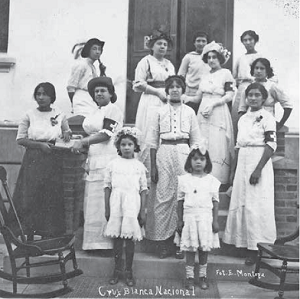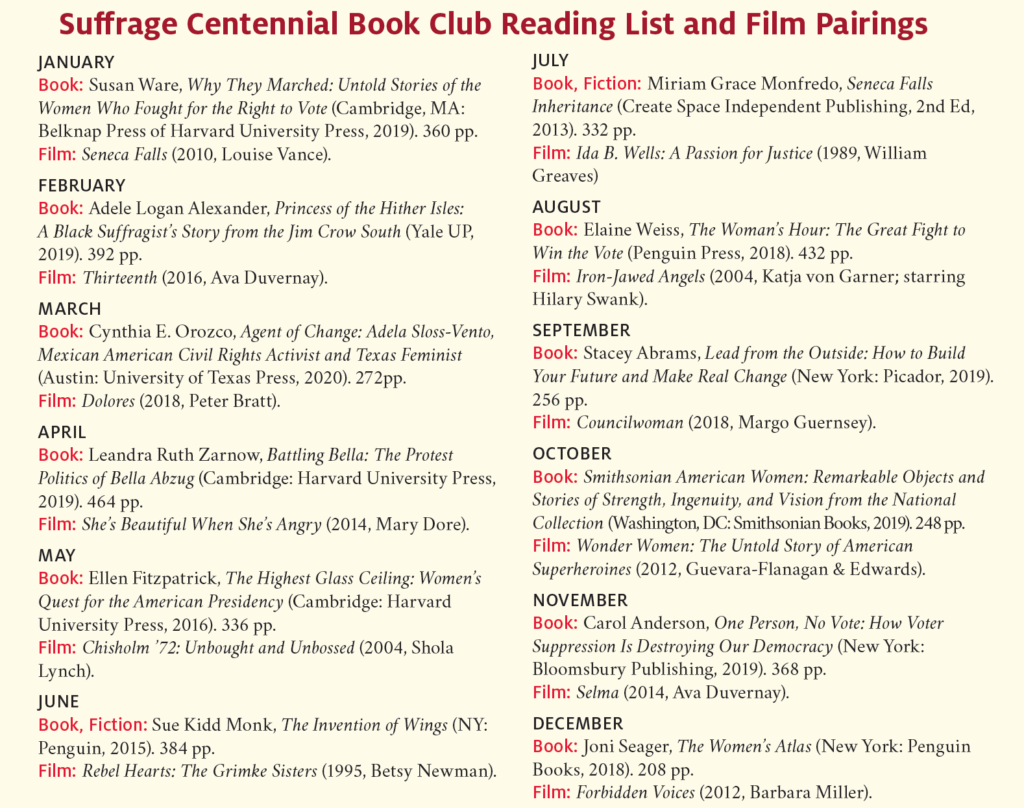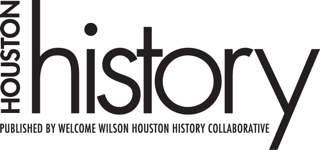By Leandra Zarnow

Mary Ellen Ewing is one example of a local suffragist who received little attention in the national suffrage accounts or even those spotlighting Texas. An officer of the Harris County Equal Suffrage Association, she was an active advocate of child welfare and city beautification, so much so she held a patent for a dustless street-sweeping vacuum.
Scroll down for book list.
On August 26, 1970, women across the United States staged a Women’s Strike for Equality to honor the fiftieth anniversary of the Nineteenth Amendment’s ratification, which secured American women’s
constitutional right to vote. Organized by the National Organization for Women, this demonstration had three simple goals: universal childcare, free abortion on demand, and equal opportunity in workplaces.
Reporters taking note saw the strike as the opening salvo of “new feminism.” Fast forward to 2020, abortion is now legal, but access to reproductive health services is uneven in Texas and nationally. Likewise, the United States continues to lag behind most developed nations on family leave policies and subsidized childcare. And the #MeToo movement has called into question sexualized power dynamics at work in just about every industry.
The centennial of women’s suffrage provides an occasion to take stock of women’s status in U.S. society in the last one-hundred years. We celebrate how far the ball has moved forward since 1920 — and 1970 — while acknowledging how precarious the goal of human rights for all American women remains. In Houston, one way we have decided to think reflexively about this paradox is to host a year-long Suffrage Centennial Book Club. This venture is a joint effort of the University of Houston Friends
of Women’s Studies, League of Women Voters of Houston, and Houston Public Library. Throughout 2020, in community centers, classrooms, living rooms, and library branches, Houstonians will meet to discuss books and films, in some months alongside authors and city leaders.
Why a book club? Foremost, a book club honors women as authors and thinkers, drawing focus to their voices and their ideas articulating the importance of civic engagement. Women’s suffrage was accomplished through protest and pageantry, but also through moving speeches, biting editorials, formally lodged petitions, and persuasive letter-writing. Amazingly, the national ratification campaign victory in 1920 turned on one “yes” vote in Tennessee, which belonged to twenty-four-year-old Harry Burn. A persuasive writer, his mother Phoebe Ensminger Burn encouraged at the eleventh hour, “Don’t forget to be a good boy, and help Mrs. ‘Thomas [Carrie Chapman] Catt’ with her ‘Rats.’ Be
a good boy and help Mrs. Catt. . . put rat in
ratification.”

Disenfranchisement during the Jim Crow Era not only limited voting for Texas’s women of color, it has centered historians’ focus locally on white women’s suffrage. Looking beyond electoral politics, for instance, Leonor Villegas de Magnón founded the relief organization La Cruz Blanca to provide aid in Laredo during the Mexican Revolution and recounted her political life in La Reblede.
Reading a range of books together as Houstonians, we can talk through and
expand our understanding of the heroic story of women’s suffrage. This narrative typically begins in Seneca Falls, New York, where Elizabeth Cady Stanton, Lucretia Mott, Frederick Douglass, and others gathered to discuss women’s rights in 1848. Most accounts conclude in 1920, in the aftermath of wartime White House pickets and suffrage parades that helped turn the tide toward women’s suffrage. Historians have taken this centennial moment to complicate this story, raising the point that the suffrage movement had any beginnings and many endings — most significantly, the 1965 Voting Rights Act. The books selected in this series draw attention to this complicated chronology and a wider vanguard of figures. For instance, historian Susan Ware highlights in Why They Marched mountaineers, cartoonists, sister-wives, “race women,” and men for suffrage previously overlooked. Equally so, historian Adele Logan Alexander traces the story of her grandmother, a black suffragist for whom she was named, reminding that the color line ran through the suffrage movement.
The Suffrage Centennial Book Club reading list and film accompaniments were selected to encourage conversation about women in politics and voting rights since 1920 as much as to reflect on the movement’s development. For this reason, our late spring selections center on the questions: Why has it been difficult for women to crack the highest political glass ceiling? And why has the campaign for equal political power stretched on longer than that of voting power? Drawing attention to Cynthia Orozco’s new work on Adela Sloss-Vento, and my book that highlights the 1977 National Women’s Conference in Houston, we also hope to make clear that Texas has a rich and varied history of women’s political engagement. It expands beyond suffrage, across social movements, and in and out of traditional political venues.
Summer selections — a classic murder mystery set in Seneca Falls by Miriam Grace Monfredo and a moving tale of young Sarah Grimke and her handmaiden Hetty Grimke by Sue Monk Kidd — offer a dose of whimsy as we prepare for a fall of big thinking on how to move forward after the
August centennial. How should a shared suffrage past be remembered and invoked to forge ahead? What do women want at this hundred-year mark? Do women offer a distinct form of leadership in government? How can gender parity in electoral politics be achieved? And what actions can be
taken to make voting more democratic in the twenty-first century? It is these questions, we hope that #SCBC participants will ponder in fall as they read selections by journalist Elaine Weiss, archivists at the Smithsonian, geographer Joni Seager, historian Carol Anderson, and politician Stacey Abrams. The result will be a vibrant 2020 that looks toward the future drawing on the lessons of the past.

You can also view the Suffrage Centennial Book Club Reading List and Film Pairings through here.

 Follow
Follow